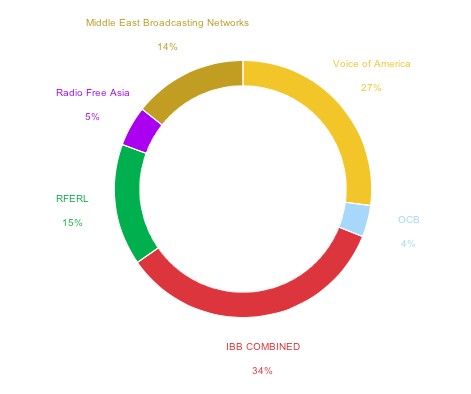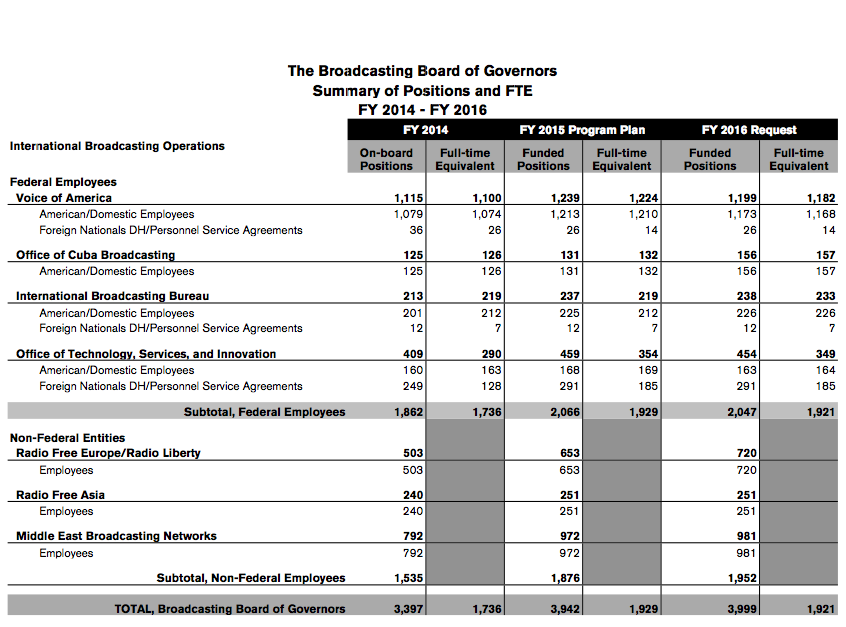BBG WATCH EXCLUSIVE
BBG Watch has received from a source within the Broadcasting Board of Governors (BBG) a new secretly written document designed to serve as a series of briefing memos for BBG’s new Chief Executive Officer (CEO). He is expected to be named soon by the BBG Board chaired by Jeff Shell.
Since the new Chief Executive Officer will never receive this kind of honest briefing from International Broadcasting Bureau (IBB) officials, several well-placed individuals working for BBG produced their own analysis of how the federal bureaucracy in charge of U.S. international media outreach operates. They want it to be shared with BBG members, the new CEO, the White House, the OMB, other federal agencies, members of Congress and American taxpayers.
BBG Watch will present this analysis over the next several days in a series of “Briefing Memos for New BBG CEO.” These briefing memos are a collaborative effort.
Briefing Memo 1 for New BBG CEO – IBB Overview
While BBG Watch, an independent watchdog blog, has been exposing various problems within the Broadcasting Board of Governors (BBG), individual BBG entities may sometimes be seen as being at fault. It is important to note, however, that they are not responsible for many management and support decisions. By the organizational structure, they have to rely on the International Broadcasting Bureau (IBB).
Since the establishment of the BBG/IBB Interim Management Team in January 2014, efficiency of the Voice of America (VOA) operations dependent on IBB, which we are able to observe first-hand, has never been worse. Suzie Carroll, Robert Bole and André Mendes are fighting among themselves every day. They are competing for Chairman Shell’s favor. It is embarrassing.
When BBG Watch reported in March 2014 on U.S. Senator Roger Wicker’s (R-Miss.) appeal to the Broadcasting Board of Governors not to close Radio Free Europe / Radio Liberty’s (RFE/RL) Balkan Service and Radio Free Iraq, the article addressed the core issue of the BBG: Many of the BBG broadcast services have been eliminated or reduced in recent years, while the number of mostly bureaucratic IBB positions — which ostensibly exist to support these programs — “has increased by 37% in the last seven years.”
BBG Watch was correct in observing that IBB has become a bureaucratic nightmare and cancer that is killing the BBG’s mission; that IBB executives were proposing new program/broadcast cuts and programming position cuts every year while increasing their own budget and positions; that IBB does not produce any broadcasts or any other programs; that consecutive BBG boards found it convenient to have IBB executives in control of the BBG budget.
However, the 37% increase in the number of positions is just one part of the much greater problem. What BBG Watch did not calculate was the total cost of IBB operations. It is the total cost of IBB operations which represents an enormous waste of U.S. taxpayers’ dollars — a far greater amount than salaries for IBB FTE positions alone.
As the new CEO you may want to ask what happened to the earlier proposal that IBB will reduce its bureaucracy by $10 million in FY2015? In our briefing memos, we will share with you IBB tricks and tactics.
You should know that the International Broadcasting Bureau is not well managed, efficient or effective. It is bureaucratic, incompetent and slow.
However, there are two broad categories of IBB functions — one more useful than the other.
Functions such as Global Operations, HR, Contracts, Security, Budget are needed, although they could be transferred to the entities. On the other hand, the so-called brain trust of the IBB Global Strategy operation is totally redundant and useless.
When IBB proposed to cut $10 million two years ago, clever IBB executives intentionally focused the cuts on Global Operations, HR, Contracts and a few other functions truly needed by the Voice of America and the Office of Cuba Broadcasting (OCB). IBB stopped posting vacancy announcements, slowed down processing personnel paperwork and delayed posting Purchase Order Vendor (POV – contractor) positions to the Federal Business Bulletin. VOA and OCB were penalized immediately by these actions and had no choice but to advocate against cuts to the IBB budget. It was overlooked that the cuts could have come instead from IBB Global Strategy with its $40 million annual budget for research, strategy, performance measurement, digital design and R & D. We will explain in subsequent Briefing Memos for New BBG CEO why this cut to IBB’s Global Strategy would have absolutely no negative impact.
ALSO SEE: Briefing Memo 2 for New BBG CEO – IBB Silencing Voice To The Voiceless
ALSO SEE: Briefing Memo 3 for New BBG CEO – What Do IBB Executives Do? They Travel
ALSO SEE: Briefing Memo 4 for New BBG CEO – IBB Office of Digital Design and Innovation
ALSO SEE: Briefing Memo 5 for New BBG CEO – IBB’s $50 Million Gallup Contract
Broadcasting Board of Governors Appropriations FY2016 Request
[piechart donut=”0.6″] { label: “Voice of America”, data: 206683000},{ label: “OCB”, data: 30321000},
{ label: “IBB”, data: 61010000},
{ label: “Office of Technology…”, data: 178587000},
{ label: “Internet Freedom…”, data: 12500000},
{ label: “Broadcasting Capital…”, data: 10000000},
{ label: “RFERL”, data: 116800000},
{ label: “Radio Free Asia”, data: 38500000},
{ label: “Middle East Broadcasting Networks”, data: 109600000}
[/piechart]
Broadcasting Board of Governors Appropriations FY2016 Request – 34% IBB COMBINED
[piechart donut=”0.6″] { label: “Voice of America”, data: 206683000},{ label: “OCB”, data: 30321000},
{ label: “IBB COMBINED”, data: 262097000},
{ label: “RFERL”, data: 116800000},
{ label: “Radio Free Asia”, data: 38500000},
{ label: “Middle East Broadcasting Networks”, data: 109600000}
[/piechart]


